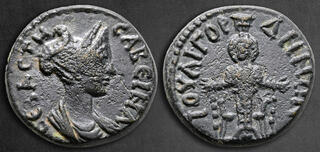Lot description:
Lydia. Gordos - Iulia. Sabina. Augusta AD 128-137.
Bronze Æ
17 mm, 3,28 g
СΑΒЄΙΝΑ СЄΒΑСΤΗ, draped bust right / IΟVΛI ΓΟΡΔΗΝΩΝ, cult statue of Artemis Ephesia, with supports, between two stags.
Very Fine
RPC III 2555.
Vibia Sabina, also known as Sabina Augusta, was a Roman empress who lived during the 2nd century AD. She was born in AD 86 in Rome to Matidia, the daughter of Emperor Trajan's sister. As a result, she was the great-niece of Emperor Trajan. In AD 100 Sabina married her second cousin, Hadrian, who would later become the Roman Emperor. The marriage was part of a strategic alliance to secure Hadrian's position as Trajan's successor and to ensure political stability within the empire.
However, historical accounts suggest that their marriage was not a happy one. Hadrian was known for his many travels and military campaigns, often leaving Sabina behind in Rome. The couple had no children, further straining their relationship. As empress, Sabina was expected to fulfill her ceremonial and public duties, but she largely stayed out of the political spotlight. She focused on supporting the arts and culture, becoming a patroness of poets and philosophers. Sabina's life came to an end in AD 136. The exact circumstances of her death remain uncertain. Some historians speculate that she might have died of natural causes, while others suggest that her husband, Hadrian, may have been involved in her death.
Starting price: 50 EUR |  |